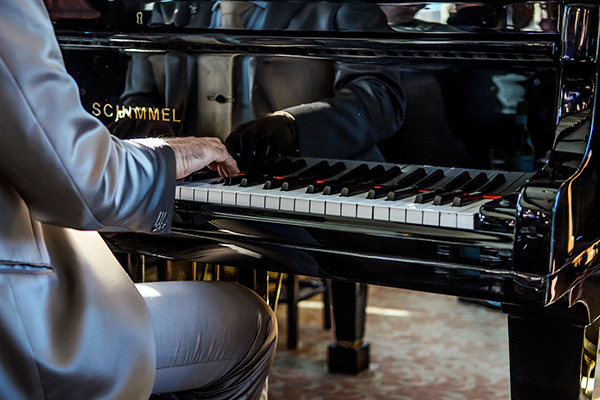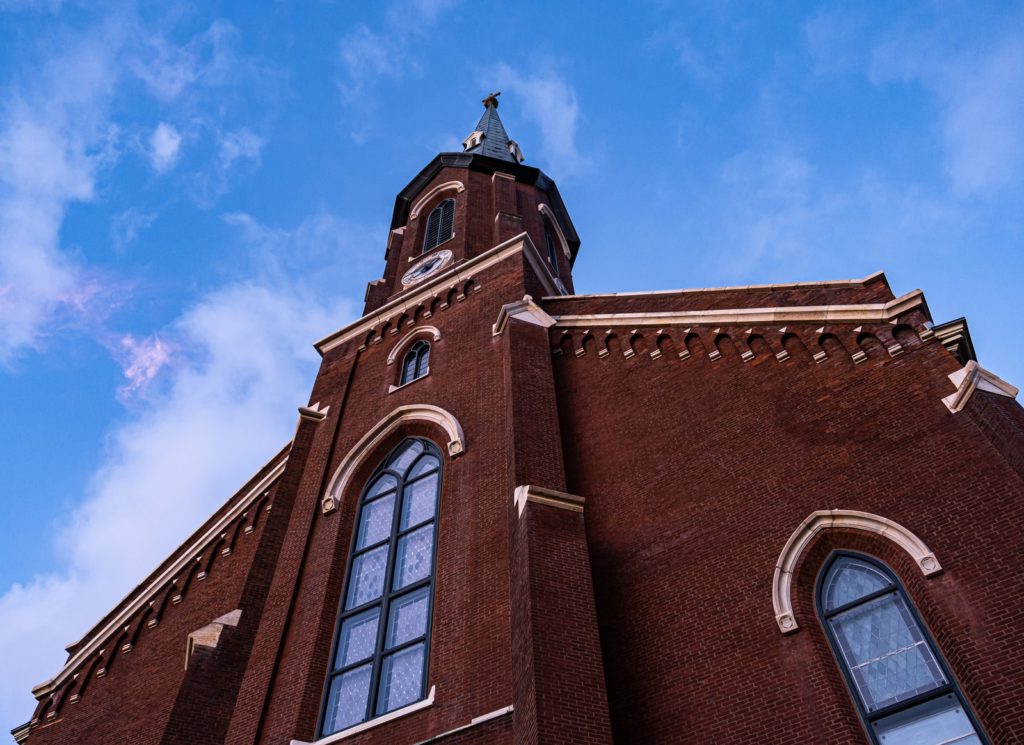Thom S. Rainer says that when people are gathering for worship these days, they’re singing less and less.
It’s a “clear reality” that congregational singing is waning in many churches, he wrote Oct. 24 on the blog he keeps as president and CEO of LifeWay Christian Resources in Nashville. “In some churches it seems to have disappeared altogether,” he wrote.
Why is that the case? Rainer lists six primary reasons as to why he — with the input of Mike Harland, director of LifeWay Worship — thinks “that act of worship before God (has) become nominal in so many contexts.”
They range from songs being in an un-singable key to the music being too loud.
Some Alabama Baptist worship leaders agree with his reasons. Others differ.
But Dan Odle, minister of worship arts at Hunter Street Baptist Church, Hoover, says at the end of the day, part of the role of the worship leader is to put great thought into how to involve more members of the congregation in worship.
Because, he said, “at the end of the day, everybody wants to sing their song. Whether you’re 85 or 8, everybody wants to sing their song. So how do we give every member of our church an opportunity to sing their song?”
For Odle, one of the ways is to address Rainer’s first reason.
1. Some church members do not prepare themselves for worship.
On his blog, Rainer wrote that some come to church “to judge, to check off an obligation or to go through the motions. We have not prayed for God to do a work in us through the worship.”
Keith Hibbs, director of the office of worship leadership and church music for the Alabama Baptist State Board of Missions, said he agreed with that idea.
“I have always said that the corporate worship of a church cannot be any stronger than the individual member’s personal worship,” Hibbs said. “We don’t prepare for worship; we come expecting what can we get out of it instead.”
He noted that Odle is doing a good job addressing this in his church through a website aimed at helping people prepare for congregational music.
“It has some things on it that individual members can do to prepare to come to worship,” Hibbs said.
One of those is to list the songs that will be sung that Sunday morning, thus addressing Rainer’s second reason.
2. We don’t know the songs.
“We sing the songs we know,” Rainer wrote. “That is obvious. But if we are introduced to a steady influx of new songs without sufficient time to learn them, we don’t participate. The best congregational singing includes both the familiar and the new.”
Hibbs said he was trained to introduce a new song by teaching it to the choir first, then singing it on Sunday nights, then introducing it on a Sunday morning.
But, he said, the prevalence of Christian contemporary radio now means that “for the large part churches are pretty familiar with the songs already.”
“When we introduced ‘Good, Good Father,’ for instance, I wasn’t sure how well they would know it, but they sang along with it,” Hibbs said.
Michael Adler, worship pastor at Shades Mountain Baptist Church, Vestavia Hills, said he doesn’t see this reason as much of an issue, as most worship pastors he knows “understand intimately the connection between familiar songs and a church that will sing.”
Adler, who also coaches worship leaders across the country through Slingshot Group, said most churches he knows also do a good job of addressing Rainer’s third reason, but he does know there are some who don’t.
3. The songs are not sung in a range where we can participate.
Rainer pointed out in his blog that many trained musicians have a wider vocal range than most of the rest of their congregation. “If we are expected to sing in a range that is beyond our ability, we won’t try,” he wrote. “Worship leaders make the decision, intentionally or not, if they want to lead the congregation or perform for the audience.”
Hibbs said that, as he visits churches, he often sees members of congregations “struggling all the time to sing the range the worship leader is singing the song in.”
Roy McNiel, minister of worship for Gardendale First Baptist Church, said he definitely agrees, “especially since I’m a baritone that has a few high notes.”
Most singers “aren’t Chris Tomlin or the singer for Elevation worship,” he said. “We lower the majority of our songs to put them in a more singable key not only for me but also for the congregation.”
4. The lighting communicates performance rather than participation.
Rainer writes under his fourth reason that congregation members participate in singing when they can hear and see each other.
“If the lighting for the congregation is low, but it is bright for the platform, we are communicating that a performance is taking place,” he said. “We thus fail to communicate that the worship by singing should include everyone present.”
But Adler said he has found this to be far from the case in his experience.
“I have had this conversation across age groups and it seems to be an issue that is segmented by age,” he said. “Millennials consider a darkened room much more conducive to worship and don’t consider it performance at all. They feel that glaring light showing everyone in the room opens the opportunity for posturing and posing in the congregation when they just want to be alone and anonymous with God. I tend to agree.”
McNiel also said he thinks dimming the lights at certain times for some can “help your personal time with God to really focus on Him.”
5. The music is too loud to hear others in the congregation.
Rainer writes that when it comes to the volume of music, the “greater issue” is whether individuals can hear others singing. If the music is so loud that people can’t hear others, they won’t sing, he writes.
It’s a legitimate concern, Adler said.
“The combined factors of room acoustics and front-of-house volume will definitely skew whether the congregation has a sense of community or isolation,” he said. “If the sound is so loud that the human voice is inaudible if not on a microphone, there is also the issue of participation.”
McNiel said it’s something that needs balance.
On energetic songs, he said, “I think some folks are actually encouraged to sing louder because they don’t feel like they’re standing out if the music was too low.”
But on the other hand, McNiel said, “The reason I end worship many times singing a cappella or telling the band to play softly is because I want to hear the congregation singing. It’s good to let them hear themselves singing and to hear how incredible all their voices sound when they’re praising the Lord.”
6. The worship leaders are not listening to the congregation.
Rainer writes that worship leaders can only lead when they can actually hear the congregation singing.
“Some (leaders) can only hear the instrumentation and platform voices from the monitors. And some have ear monitors where they are truly blocking the voices of the congregation,” he writes. “Congregational singing becomes powerful when it is well led. And it can only be well led if the worship leaders can hear those they are leading.”
Hibbs said he agreed that it’s important for leaders to hear the congregation.
“Leaders should provide energy to the congregation, but they should also feed off the congregation,” he said. “It’s like a dialogue.”
In the end, it’s most important for worship leaders to spend time assessing what will help their congregation best participate in singing.
“It’s so important for everybody in the congregation to participate, cross generationally,” Hibbs said. “One of my favorite things is to see a child sing like gangbusters. They love to sing. If you’re doing a song that is singable and senior adults can sing along and learn the songs, to see them participating too is some of my favorite moments in worship. It’s about participation; it’s not about performance.”
Be intentional about worship
A lot of people in many churches have grown up “where you just show up on Sunday morning” without much, if any preparation, said Dan Odle, minister of worship arts for Hunter Street Baptist Church, Hoover.
So a couple of years ago, he and others in his church decided to help their people better prepare their hearts for Sunday morning worship, he said.
They set up a website — hunterstreetworship.org — to give their congregation early access to the order of worship, along with other things to help them prepare to meet God on Sunday mornings through singing.
“We wanted to help people be more intentional and teach them that corporate worship is something that you can prepare for,” Odle said. “We post links to songs and lyrics that we will sing, and I write about the purpose of the song and why we are singing it. We hope this will help them connect better with the songs when they come to the service.”






Share with others: